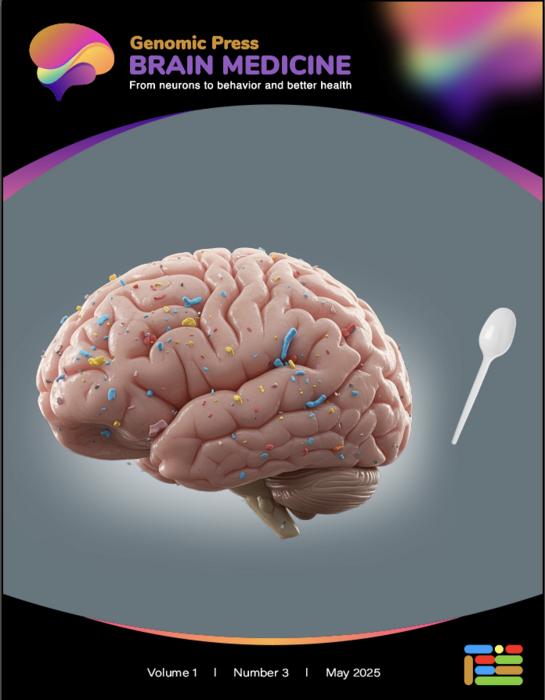In an alarming scientific development, researchers have uncovered mounting evidence indicating that microplastics—microscopic fragments of plastic less than five millimeters in size—are not only pervasive in the human body but are accumulating in the brain at quantities roughly equivalent to the volume of a plastic spoon. These findings have been comprehensively documented in a series of four interconnected papers published in the May 2025 issue of Brain Medicine, a prominent neurology research journal. This collection synthesizes the possible link between microplastic exposure, particularly through ultra-processed foods, and a spectrum of mental health disorders including depression, anxiety, dementia, and disrupted sleep patterns.
The cover image of this issue strikingly depicts a human brain marred by a constellation of multicolored microplastic particles scattered on its surface, alongside a white plastic spoon standing in symbolic representation of the approximate amount of microplastic material harbored within the average brain. What is particularly disconcerting is that these microplastics are not inert bystanders; they have been found in concentrations three to five times higher in individuals diagnosed with dementia compared to those without cognitive decline. The plastic particles vary widely in polymer type, with polyethylene—a common constituent of consumer plastics—dominating the composition.
The body of evidence linking microplastic bioaccumulation to mental health disorders is rapidly expanding. The research team behind these articles, including experts from institutions like the University of Ottawa, the University of Toronto, Loma Linda University School of Medicine, and Deakin University’s Food & Mood Centre, have proposed a compelling hypothesis. It posits that the surging consumption of ultra-processed foods serves as a key vector for microplastic intake, and that these tiny fragments can breach the blood-brain barrier, thus infiltrating neural tissue and potentially triggering or exacerbating psychiatric and neurodegenerative diseases.
Ultra-processed foods have been under scrutiny for their detrimental effects on mental well-being, with studies indicating that individuals consuming higher proportions of such foods face significantly increased risks of depression and anxiety. A seminal umbrella review published in The BMJ elucidated that ultra-processed food consumption elevates depression risk by 22%, anxiety by 48%, and sleep disorders by 41%. The novel insight from this collection of papers is that microplastic contamination might be a previously unrecognized factor underlying this association, offering a tangible mechanistic link beyond traditional nutritional deficiencies or additives.
Further intensifying concern is quantifiable data demonstrating that certain ultra-processed foods harbor exponentially greater microplastic loads than minimally processed alternatives. For example, chicken nuggets contain approximately 30 times more microplastics per gram than natural chicken breast meat, underscoring how industrial food processing and packaging contribute to the problem. These microplastics are likely introduced through multiple routes, including food contact materials, environmental contamination during manufacturing, and additives within the food matrix.
The biological pathways by which microplastics exert neurotoxic effects appear to overlap extensively with the established mechanisms linking ultra-processed foods to mental health issues. Chronic inflammation, oxidative stress, epigenetic modifications, mitochondrial dysfunction, and disturbances in neurotransmitter systems constitute a common etiological platform. Microplastics have been experimentally shown to induce inflammation and oxidative damage in neural and systemic tissues, making their accumulation within the brain a potential catalyst for neuropsychiatric decline.
To deepen understanding and quantification of dietary microplastic exposure, the researchers advocate for the development of a standardized Dietary Microplastic Index (DMI). This tool could provide a metric to assess individual and population-level risk, facilitating epidemiological studies to elucidate dose-response relationships and identify intervention targets. Such a framework would be invaluable for public health policy and nutritional guidelines in the face of mounting environmental plastic pollution.
The urgency of this scientific revelation is skillfully contextualized by a guest editorial titled Una cuchara de plástico en tu cerebro: The calamity of a plastic spoon in your brain by Dr. Ma-Li Wong. The editorial frames microplastic infiltration of the brain not merely as a hazard but as a profound challenge to the conceptual boundaries between the external environment and the internal sanctum of the human body. The ability of synthetic particles to transgress biological barriers traditionally regarded as impregnable calls into question longstanding assumptions about bodily integrity and environmental safety.
Taken together, these papers urge a paradigm shift in how public health stakeholders, neuroscientists, and environmental scientists approach mental health. Where once the discourse centered largely around nutrition and psychosocial factors, the evidence positions microplastics as a pernicious environmental neurotoxin warranting urgent attention. The authors unanimously call for intensified research efforts that integrate environmental science, neurobiology, and epidemiology to unravel the multifaceted impacts of microplastic pollution on brain health.
In the interim, a clear call to action is emphasized—reducing ultra-processed food consumption stands as an actionable measure to diminish microplastic exposure. Concurrently, accelerated innovation is needed in food packaging and industrial processing to minimize microplastic contamination. Together with improved detection and potentially therapeutic removal techniques, these interventions may mitigate the burgeoning crisis of plastic-induced neurotoxicity.
As microplastics intertwine with lifestyle and environmental determinants of mental illness, the implications extend far beyond neuroscience. This interface of ecology, public health, and clinical medicine underscores a profound intersection of planetary and human health. Ultimately, the adage “you are what you eat” acquires an unsettling new dimension in an era where even our brain’s microenvironment reflects the escalating tide of plastic pollution.
Subject of Research: microplastic accumulation in human brain and its link to ultra-processed foods and mental health disorders
Article Title: Una cuchara de plástico en tu cerebro: The calamity of a plastic spoon in your brain
News Publication Date: 20 May 2025
Web References:
https://doi.org/10.61373/bm025c.0020
https://doi.org/10.61373/bm025v.0068
https://doi.org/10.61373/bm025l.0056
https://doi.org/10.61373/bm025g.0062
Image Credits: Genomic Press
Keywords: microplastics, brain, mental health, ultra-processed foods, dementia, neurotoxicity, inflammation, oxidative stress, blood-brain barrier, therapeutic apheresis, environmental contaminants
Tags: anxiety linked to plastic ingestionbrain health and microplasticsconnection between diet and brain healthdementia and environmental toxinsdepression and microplastics exposureimpact of microplastics on cognitionmental health disorders and plasticsmicroplastics accumulation in the brainmicroplastics in ultra-processed foodsneurotoxicity of microplasticspolymer types in microplasticsultra-processed foods and health risks





